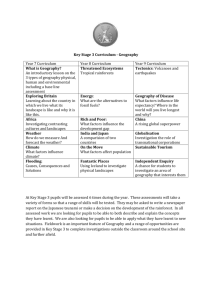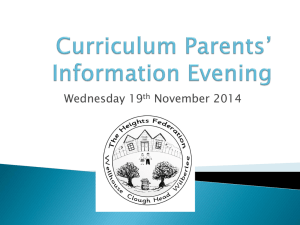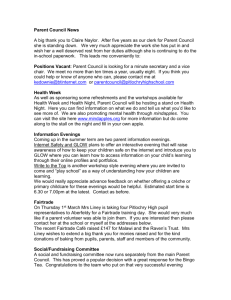KS2 Teachers Notes - Geography in the News
advertisement
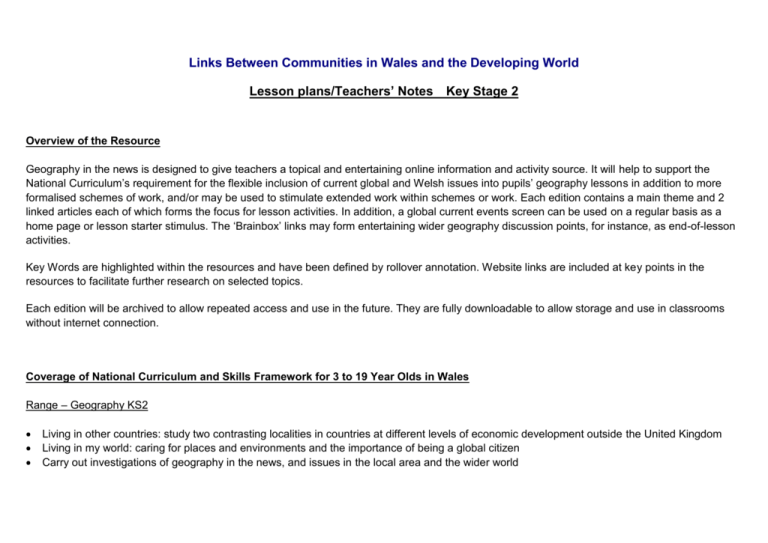
Links Between Communities in Wales and the Developing World Lesson plans/Teachers’ Notes Key Stage 2 Overview of the Resource Geography in the news is designed to give teachers a topical and entertaining online information and activity source. It will help to support the National Curriculum’s requirement for the flexible inclusion of current global and Welsh issues into pupils’ geography lessons in addition to more formalised schemes of work, and/or may be used to stimulate extended work within schemes or work. Each edition contains a main theme and 2 linked articles each of which forms the focus for lesson activities. In addition, a global current events screen can be used on a regular basis as a home page or lesson starter stimulus. The ‘Brainbox’ links may form entertaining wider geography discussion points, for instance, as end-of-lesson activities. Key Words are highlighted within the resources and have been defined by rollover annotation. Website links are included at key points in the resources to facilitate further research on selected topics. Each edition will be archived to allow repeated access and use in the future. They are fully downloadable to allow storage and use in classrooms without internet connection. Coverage of National Curriculum and Skills Framework for 3 to 19 Year Olds in Wales Range – Geography KS2 Living in other countries: study two contrasting localities in countries at different levels of economic development outside the United Kingdom Living in my world: caring for places and environments and the importance of being a global citizen Carry out investigations of geography in the news, and issues in the local area and the wider world Skills – Geography KS2 Identify and locate places using globes, atlases and maps Describe the causes and consequences of how places and environments change, e.g. the need for sustainability Identify similarities and differences to compare and contrast places Make decisions about geographical issues Skills Framework and Assessment for Learning The accompanying lesson plans aim to support the requirement for a skills-focussed curriculum. Where appropriate in the lesson plans, suggestions will be shown where thinking skills, communication, ICT and number skills can be applied in the context of geography. Investigative work lends itself very well to assessment for learning. For example, at the beginning of a study children can establish where they are in their learning and suggest what they want to find out. At the end of a study, children can assess their own achievement and indicate it by using simple techniques such as drawing smiley faces or by showing traffic light symbols in their work. The use of questioning throughout the activities encourages children to reflect on their understanding and help further their learning. Opportunities to use assessment for learning strategies will be indicated as AfL. Fairtrade Aim: To enable pupils to learn more about trade and interdependence between countries. Building on prior learning from the main resource pupils should learn that the current rules of trade favour rich countries and hold back development in poorer countries. Pupils should learn that fairtrade is a way of overcoming these problems. Pupils will hopefully take part in Fairtrade Fortnight and possibly undertake some form of activity. Key Skills Objectives Subject Objectives and Skills Activity Thinking Skills Geography Background Plan Ask questions related to context and listen before The activity is intended to introduce pupils to fairtrade and how it can asking further questions. Develop Identify and locate places using globes, help countries develop economically. Pupils should identify ways in which atlases and maps they can change their habits as consumers and as a result help LEDC Describe the causes and consequences countries improve levels of development. Identify and describe similarities and differences of how places and environments by making simple comparisons. change, e.g. the need for sustainability are connected through trade and that the rules of trade favour the rich Make decisions about geographical countries. Discussion activities will encourage children to learn that if trade issues becomes fairer then the poorer countries will develop more quickly. Reflect Describe what has been learned/found out. Pupils need to be aware that countries at different levels of development Living in my world: caring for places and Communications environments and the importance of Activities Oracy being a global citizen 1. Use the resource to learn the basics of fairtrade and how it works. Show an awareness of the needs of the Examine the Gumutindo case study and locate countries in Africa. listener, asking questions and responding to the Continue with group discussions: suggest what life was like before being a contributions of others. fairtrade farmer and what life is like now. Reinforce the benefits of belonging to a fairtrade scheme. Wider Communications Represent and respond to information in different forms including pictures, sounds, symbols, diagrams, maps, tables and graphs Children conduct a survey on the kind of fairtrade goods they know about or buy. Draw up the results as a graph. 2. Through literacy and creative activities, children can encourage others to switch to a fairtrade product during Fairtrade Fortnight. This could be a poster campaign, radio, role play for a TV advert, leaflets or a whole combination of Number these. Record and present data in simple tables, lists, pictograms, charts, graphs and diagrams. AfL: After each activity draw the children back to their learning – Can children describe what they have learnt, what was new for them? Which activity helped them learn the most and can they say why? Links between communities in Wales and the Developing World Aim: To inform pupils of current links between communities across Wales with other communities in LEDC’s. On March 1 st 2010 the Welsh Assembly Government will announce the Welsh recipients of UN gold stars when 3 communities from Wales will be awarded 5 gold stars. The resource will provide a focus for the UN summit later in the year to maintain momentum in the achievement of the Millennium Development Goals. Key Skills Objectives Subject Objectives and Skills Activity Thinking Skills Geography Background Plan The activity is intended to introduce pupils to the development process and the Living in my world: caring for Millennium Development Goals. It follows up on the ‘Make Poverty History’ campaign Develop places and environments and the and feeds in to the requirements of ‘living in my world … the importance of being a Identify and describe similarities and importance of being a global global citizen’ component of the range within the National Curriculum orders. differences by making simple comparisons. citizen Plan the process to be used Reflect Living in other countries: study Begin to evaluate outcomes against success two contrasting localities in criteria. countries at different levels of Pupils need to be aware that Wales as part of the UK is a wealthy developed country and that most people in the world live in much poorer countries. Activities economic development outside Each image/ animation can be used on a whiteboard as a stimulus for whole the United Kingdom class questioning and discussion on the basis of: Identify similarities and 1. What is Development? – leading to discussion on ‘How developed is Wales?’ Communicate clearly and confidently in a way differences to compare and Children could compare and contrast the social and economic (as well as cultural e.g. that suits the subject, audience and purpose, contrast places both may have costume, anthem, flag) indicators of a LEDC and a MEDC. Use Venn Communications Oracy using a range of vocabulary, including some diagram to show similarities and differences. key words related to subject. AfL: Encourage children to suggest a method of representing their discussion ideas in a diagram. After the activity the children can evaluate whether the diagram was an Wider Communications effective way to show information or what improvements they would make next time. Represent and respond to information in different forms including pictures, diagrams, 2. What are the MDG’s and how will they help other countries to develop? maps, tables and graphs Promote discussion about helping other countries sustain a fair standard of living by linking to Fairtrade Week. In groups children collate comments into a mind map of how Number people in MEDC can rise to the challenge of halving poverty around the world by 2015! Record, interpret and present data in AfL: simple tables, lists, pictograms, charts, learning. Compare the mind maps to see if there are any similar ideas and encourage graphs and diagrams. the children to give suggestions why some ideas are the same. Use the mind map activity to further the children’s understanding of their

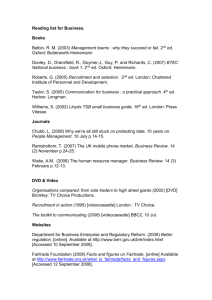
![afl_mat[1]](http://s2.studylib.net/store/data/005387843_1-8371eaaba182de7da429cb4369cd28fc-300x300.png)
